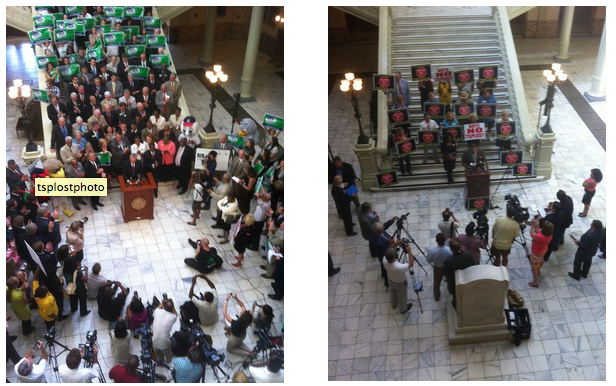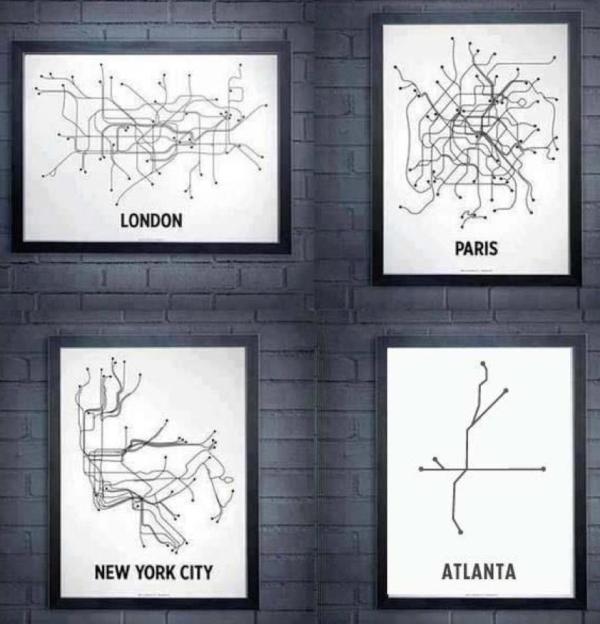
It was fitting that yesterday, the eve of the Atlanta region's historic transportation vote, the Georgia NAACP filed a civil rights suit against the state Department of Transportation alleging discrimination in contracting. Meanwhile, the head of the DeKalb County NAACP has come out against the T-SPLOST tax proposal, saying it will hurt minority-owned businesses. He even took a shot at Atlanta Mayor Kasim Reed, a dogged supporter of the referendum, saying “certain blacks” had been duped into supporting the tax proposal.
The proposed one-cent sales tax to support $7 billion in road and transit projects has drawn opposition from some seemingly unlikely places. Considering that this spending package represents a significant investment in rail and bus service for a region with notoriously poor transit options (the funds split fairly evenly been transit and road projects), the fact that the Sierra Club of Georgia is against it may surprise some. The group has been one of the biggest critics of the plan, saying the "haphazard" project list does not constitute a cohesive transportation strategy and is too heavy on roads. Add to that the opposition of some of the black leaders in urban DeKalb County, and tack on the Georgia Tea Party, which draws its strength from the farthest reaches of the exurbs.
Meanwhile, the spending measure enjoys overwhelming political and business support in Atlanta. Coke, Home Depot, Delta, UPS, Clear Channel, Turner Broadcasting, and Georgia Power Company have all given money to support the $8 million campaign for its passage.
Yesterday, Georgia's Republican Governor Nathan Deal held a rally with Atlanta's Democratic Mayor Kasim Reed, making a last-minute appeal to voters in the 10-county Atlanta region. Neither man was pulling any punches. Without this new tax, they said, metro Atlanta's transportation system -- and perhaps the whole regional economy -- is headed in a bad direction.
If the referendum fails, "we simply don’t have the resources to ensure that Georgia has an adequate transportation network," said Deal.
Reed dismissed the Sierra Club's assertion that if voters turn down the package of 157 projects, a new, more transit-heavy list could be produced and passed quickly.
"It took four years to get a bill that you all could vote on," said Reed. "If we fail, nobody better come and ask me to do it again."
Meanwhile, opponents of the measure, united under the banner of the Transportation Leadership Coalition, rallied at the statehouse, calling the transportation referendum "a political scheme to squeeze $18 billion out of Georgia taxpayers." (Atlanta's referendum is just one of 12 transportation taxes being voted on today all across Georgia.)
Remarking on the better attendance at the pro-referendum rally, the Atlanta Journal Constitution wrote that "if elections were press conferences," the odds are seemingly in proponents' favor.
But polling data show the opponents' messages seem to be resonating more clearly with voters. Early voting tallies show only a third favoring the one-cent tax proposal. Wider polls showed 51 percent oppose the tax and just 42 percent support it, though the referendum's proponents insist the race is closer.
Local blogger Maria Saporta noted that the tax issue seems to have magnified divides -- political, social, philosophical -- in the Atlanta region. Saporta said today's vote -- whether the Atlanta region will choose to address its notorious traffic congestion as a region -- may be "the biggest test of whether we are a cohesive region."
Many voters in urban DeKalb and Fulton counties have complained that they already pay a one-cent tax to support MARTA, the regional transit system. Meanwhile, many suburban and exurban counties resent having to support a transportation system they may have never used.
"The nuance that has been lost in the campaign is how the different projects and areas in the region complement each other," said Saporta. "For example, a stronger transit system that attracts more riders will mean fewer cars on the road. Or if there are significant improvements made at the pivotal intersections of I-285 and Georgia 400, I-285 and I-85, and I-285 and I-20 west, it will help clear up our region’s clogged arteries, thereby helping improve the region’s air quality."
She concluded: "The challenge will be to get a majority of voters in the region to show the same kind of bi-partisan, regional spirit that the Regional Atlanta Transportation Roundtable showed when 21 urban, suburban, Democrat and Republican elected officials unanimously passed the $6.14 billion project list last October."






